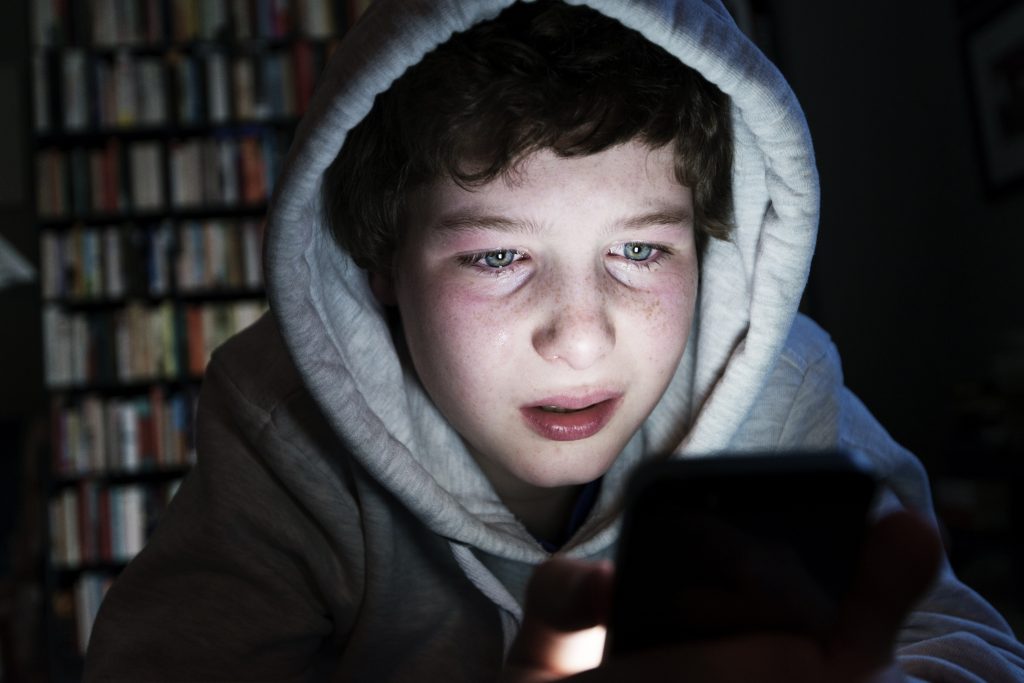JESS Digital Innovation Summit 2020 Guides Parents on Stopping Bullying and Safety Online
Background – Technology and our Children. A Force for Good. Tackling Online Bullying and Safety.
2020 marked the fourth year of the ground-breaking JESS Digital Innovation Summit in Dubai.
The event, which attracts a reach of over 10 million online, draws speakers from around the world together with leading schools and technologists to explore the increasingly life-changing issues and opportunities presented by the online world and the spectrum of cutting edge technologies that follow.
This year the focus was on safeguarding and the well-being all of us, but particularly children, in the digital world. The lines between the digital and analogue worlds are fraying at the seams and it is becoming increasingly difficult to tell one from the other.
And the warnings from the JESS Digital Innovation Summit could not have been any more stark about why we need to act, need to act together – and very quickly.
But it was also a Summit that shared the many positives of technology and aimed to give parents and schools the confidence to work through the issues and leverage the strengths of technology as a force for good.
It is true that, if we do not understand what is happening – and learn how to manage it, the impacts on our children and families – as well as the broader impacts on schools and society, will be damaging not only in the short term, but over a lifetime. A key lesson of the JESS innovation Summit 2020 was that once the damage has been done, it is extremely difficult to reverse it.
But so too social media, TV-on demand, gaming, VR, technology in Music, the Arts, Science and the Social Sciences, online learning, the ability to connect across the world with others in ways unimaginable even two decades ago, security cameras everywhere ….. in these areas, as countless others, technology can be, is, a force for good.
There are two sides to the story and we have to find, as schools, students, parents and individuals to navigate them.
On the one side, cyber-bullying causes as much damage as any bullying – in some cases more. Digital footprints are almost impossible to erase. If we, or our children make a throw away comment we, or they, may will be judged for it for life. Privacy has almost disappeared as everything we do on-line is monitored – and recorded to convert into advertising information for multinationals (or worse). CCTV, with face recognition, knows who we are, what we are doing and where we are going before even we do. Driver-less cars and 5G, the end of the combustion engine, over-population – every part of our lives has become deeply connected with technology. Technology has become the only thing left to offer any sort of solution. It eats up every thing around us whilst we seem to all watch on helplessly.
As parents, many of us worry whether our children, that today seem locked into screens of some form or other day and night – whether for gaming, social media or isolated activities, will ever forgive us when they realise, we think eventually, that they have lived a life without actually living it. And we, as parents, did nothing, or very little, to stop it.
This is a world not so far away any more from the dystopian nightmares of Huxley, Atwood and Orwell – but it is a world we are, too, complicit in making.
We choose to go online. We choose to use Facebook to download and record our every mundane action or half-baked thought and opinions. We choose to have CCTV – because the price of privacy is worth trading for safety. We choose to give our children phones and iPads because we are told we cannot leave our children behind – and because of not disadvantaging them with their peers. Selfie cameras are de rigueur to prove we have a valuable life. Our choices as parents are constricting as the pressures grow exponentially. A day is a long time in technology …..
The last time, as SchoolsCompared.com, we visited a school, we left depressed when the Head spent all his time with us proudly showcasing his cameras and security systems (in which no corner of the school was not under surveillance) than he did speaking about the primary purpose of schools – educating our children. His last thought, when we were leaving, was that one day children would be able to learn on-line surrounded by cameras, in perfect safety, online – without a teacher in site. This is, of course, a rare example.
The issues here are so many – and most of us as parents worry that somehow we have just become too accepting of the new online and technology-rich worlds. Many of us worry that we no longer know what is right and wrong, real or imaginary – or even dangerous or safe. The world, as we knew it as children, is flipping on its head , over and over, in a spiralling descent into a frightening future that we seem to have lost any control on managing, still less at times understanding.
And if some still talk of parents worrying unnecessarily it only takes a cursory look at how one man, Stellarc, is questioning the distinction between humans and machines, and the level of control we still have over the Internet, to understand why we are worried. The JESS Digital Innovation Summit shows us that we have a good reason to be aware of the risks.
https://youtu.be/90KHwo02f2E
In what follows, we look at how The JESS Digital Innovation Summit raised just these sorts of questions and tried to work through at least some of the answers for both schools and parents – and ultimately take a positive, confident world view of the opportunities that technology presents.
The positives
As parents we need to balance our concerns with understanding that technology is a force for good.
The following three videos from JESS capture this so well. Children can use Virtual Reality to travel back in time to experience history in just as powerful a way as books. Different – but just as powerful. Technology is, quite literally, creating time machines in the class room. It’s no longer just in ICT or computer Science either – VR as a tool for learning is being used in the best schools in every subject. Its use enables children to access parts of the human mind untapped and untappable in traditional ways of learning. Education as a result becomes richer, more creative and inspirational. Technology too enables education to become more inclusive, not less, as every child learns differently. Like all of us, some students learn best when stimuli are visual, some depend on sounds to learn, others need to feel and empathise. Traditional education focused far more on children who were conceptual, in the process leaving far too many of them (us) behind. If VR started to be used as part of school admissions we might just end up with less schools that restrict their intake to only the supposedly more “academic” children.
In the first video, awe-struck young children explain how VR has enabled them to explore the rain forests that most of us, even as adults, have never visited.
https://www.youtube.com/watch?v=Q72RJZaIDcc
In this second video, you can see students learning about the Wall Street Crash in ways that cannot but inspire. What technology enables educators to do is extraordinary and life changing for our children.
https://youtu.be/Q72RJZaIDcc?list=PLkorKeTc6XUbboZGlgllZAa5MdBwHhDkW
In this last video, JESS, working with Microsoft, brings to life just how pervasive technology has become in our schools today. Learning has become faster, more productive and inspirational. Many parents will be surprised to learn that the days of lessons and paper timetables on the walls of staff rooms as we knew them have simply disappeared.
https://youtu.be/gdOfyHVBSts?list=PLkorKeTc6XUaeinGQJ63ZJEXX9QAZlrCX
Other ways that technology can help children include simple, but no less effective things like helping accessibility – including spell checking and dyslexia friendly fonts to help children with dyslexia.
Technology – Parent’s Worries and an Action Plan for Dealing with the Online World
“The benefits technology brings in education are obvious and revolutionary but bring with them concerns that challenge not only our young people but all of us as we negotiate our way through the tsunami of information and social media we face every day. As educators, we are all aware of the pitfalls that exist and how technologies can be abused, expose vulnerabilities and cause damage. These are a constant concern and an area where we must share our concerns as well as our strategies and tools to protect and support well-being and mental health as best we can.”
Shane O’ Brien. Director. Jess Dubai. JESS Digital Innovation Summit 2020.
At the JESS Digital Innovation Summit, schools and educators came from around the world to ask and answer the questions that worry us the most. Actually asking these questions openly is probably as important as being able to answer all of them absolutely. The message from JESS was clear – we do, all of us have to start asking these questions. And parents must be respected for asking them too.
- How do we keep our children safe on-line?
- What are the risks?
- Are there any legal protections in the UAE to stop people using technology or the Internet for activities that can hurt us or our children?
- What can, and cannot be shown on the Internet in the UAE?
- What can, and should schools be doing to protect children on-line (“Safeguarding”) – and what should they expect from parents?
- What are the signs of potential abuse of children? What should we do when we notice them? What are schools doing?
- What should child protection as a whole look like in a school? What can we expect as parents? What should we ask for?
- What can we do to help our children lean that their validation does not begin and end with social media?
- Why are so many children children playing games with PEGI ratings of 18? How can we understand these as parents? What can schools do to explain why they are important and why these games are not suitable for children under the PEGI age rating?
- How much screen time is too much screen time?
- What is the Dark Web?
- Should students be image sharing – and should we be monitoring it?
- How do we know if an on-line profile is real – or fake?
These are the types of questions that the best schools in the UAE are grappling with today. Schools will expect you to ask them – and you can expect them to have answers and guidance.
Never feel worried about asking questions of your school. You have good reason to:
Nominet research has shown:
- 11 days on average are lost to each class every year because of issues relating to Social Media
- Almost 80% of children are accessing Social Media underage – and sites are simply not set up to properly protect them.
- 24% of children receive communications on-line from unknown adults whether through games, the Net or Social Media
BeathTheBully clarifies this further:
- 27% of children at school are more likley to report their mental health as fair or poor
- 91% of children in schools report impacts from stress ranging from depression and sorrow (58%) and lack of interest and motivation (55%)
- The most connected generation has become the most disconnected
There are alternatives to Facebook, Twitter and Snapchat.
Gobubble, for example, provides children aged 13 or under with the same sort of social networking experience Facebook and the like provides, but one that is moderated and provides restricted to their peer age group. Again, this is something that you can discuss with your school. More information can be found here.
Many schools are introducing the eCadet Programmes to help children navigate safely through social media and online networking – more information here.
Six simple pieces of advice for parents we learned at the JESS Digital Innovation Summit on how best to use social media safely are worth quoting in full:
- Always be kind – never say or do anything online to others that you would not like said about or done to you.
- Always think before you type – once you have written something online it can be impossible to ever take it back or remove it.
- Be happy and positive – criticism, argument and conflict help no one and just leads to problems
- Think before you click – it could be a trick.
- Think before you post – be careful what you boast
- Don’t be rude because you are in a bad mood
These simple pieces of advice are as useful to us as parents, as our children.
Positively too, organisations in the UAE are providing direct help to parents and schools to deal with the issue of bullying and how parents, schools and children should navigate the many pitfalls of the online world.
A good example can be found here.
The work of BeatTheCyberBully has helped parents and students at JESS, Nord Anglia, Jumeira Baccalaureate School and Cranleigh Abu Dhabi. We rate this organisation highly.
Barry Lee Cummings, their Parent Advisor, told a shocking story of how Justine Sacco, a PR Executive, sent a stupid, thoughtless and offensive tweet before getting on a flight to Africa. It was ill-judged, and what she said was offensive and attention-seeking – but she did not mean what she said. It was too late. The result was a campaign of global online shaming that resulted, by the time she landed 11 hours later, with her losing her job, her reputation and being abandoned by her friends. Her life was ruined because of thoughtlessness, a lack of kindness and negativity.
Mr Cummings advice to parents is simple:
“Be part of the conversation with your children. Stay informed. Get involved.”
The UAE Law Warning – What Your Children Do Can have Life Changing Consequences
Martin Hayward, Head of Technology (contact here), and Fiona Robertson (contact here), Head of Media, at UAE law firm Al Tamimi and Company, offered the following key legal advice for schools and parents at the JESS Digital Innovation Summit:
- Cyber-bullying, trolling and online abuse are not specific offences in UAE law – but other laws do step in to protect families and children.
- The law is very firm against breaches in the following areas:
- Religion
- Government
- Alcohol
- Smoking
- Nudity
- Sex
- Language
- Obscenity
- “Cultural and Social Mores”
- Jail and a fine can be “inflicted on any person who publishes through any means of publicity news, pictures or comments pertaining to information relating to people’s private lives regardless of whether it is true.
- Using photographs online without consent can result in “imprisonment of at least six months and [between] AED 150,000 and AED 500,000.”
- Online abuse is treated under laws of defamation. If someone posts a comment online that results in that person being seen negatively or their reputation damaged can result in a “fine, imprisonment and deportation.”
- Sexting and sending naked pictures is treated as transmitting pornography. It will lead to “imprisonment of at least six months and a fine [between] AED 150,000 and AED 500,000.” The penalty increases if the pictures are of children.
- An online, or off-line, threat of bullying (if you do not do this, I will tell everyone X) can be treated as extortion under UAE law. It may lead to “imprisonment and significant fine.”
The bottom line here is that it is very easy for children to find themselves on the wrong side of the law – and the penalties and price of making a mistake are exceptionally harsh.
Their advice is hard hitting:
“In teaching young adults about their use of social media, the importance of maintaining their reputation must be stressed at all times. It is both victims and perpetrators who have to live with the outcomes. A bullying post, a semi naked photo, a political rant can all come back to haunt them later.
Open conversations are key, and emphasis on the positive outcomes of increased communications with social media as a tool.
Report cybercrimes online through the following channels:
—The eCrime website here
—Dubai Police’s website here
—The ‘My Safe Society’ app launched by the UAE’s federal Public prosecution (the app is available on iTunes or Google Play)
Or report cybercrimes to the nearest police station in your area, or call 999 for help.”
This is perhaps the single most important tool parents have with their children to convey just how important it is to use social media responsibly. If they make a mistake the results could damage their lives, and those of their families, forever. A lack of intention may very well fall on deaf ears under UAE law …
SchoolsCompared Bottom Line: The Opportunities of Technology Shine Bright
As parents we all worry. But schools are there to support and help our children – and us all as families, navigate through the opportunities and pitfalls of our online lives.
One lesson we drew from the JESS Digital Innovation Summit this year was that schools are ahead of the curve in helping our children navigate this new world. That should give us all confidence.
In many ways, the issues facing our children are the same. Bullying wherever it takes place is still bullying. Parents have always worried about whether children are doing too much, or too little homework. Risk in some form has always been there, even when we were younger. Children, as adults, make mistakes. It is just a part of growing up – and learning, for all of us, is a life-long process.
In many ways all that has changed is the context of the discussions, not the core issues. And arguably today our schools are so much better equipped at dealing with all these issues than they were.
The JESS Digital Innovation Summit should give us all confidence as parents that our children are being looked after:
- Schools are increasingly working with students by creating “Digital Ambassadors” to train and support the teachers in keeping students safe online. This ensures that teachers are trained by the students in understanding what is happening in technology as much as the reverse and can respond quickly.
- In the best schools today, all staff at a school are responsible for the safeguarding process and are trained to hear and recognise the safeguarding signs given and spoken by students. Safeguarding is being built in the DNA of schools.
- Schools are now engaging with parents to share the knowledge and digital safety tips and information so parents can close the knowledge gap with their children.
- Our children are being educated in ways to navigate the online world with confidence and safety. This education is starting in the Primary Years.
The rate at which the world is changing is astonishing. We are living through a time with the same sorts of revolutionary impacts that we saw with the industrial and post-industrial revolutions. We can expect by 2030 the world to be an even more different, extraordinary place. But with the work being done by our schools now, whatever that world looks like, our children should be empowered to use it positively.
So too, support in areas like mindfulness and the personal well-being of our children has never been stronger in our schools. Few of us experienced this degree of investment in our personal welfare when we were at school. Our children are being looked after.
Technology in the classroom is improving the ability of teachers to teach, and our children to learn.
Digital photography is enabling us all to document the world and better understand it. At its best, digital film and photography are wonderful way of sharing meaningful experiences.
Finally, schools like JESS are using “dashboards” and the spectrum of digital tools to ensure teachers have access to live data on their students. They can track each child’s progress in ways unimaginable even five years ago. In practice this means that the attention each child gets has quadrupled and more – teachers can today make swift interventions to ensure that no child is ever left behind. The chance of a child being lost in the middle is a thing of the past.
If there are pitfalls in the digital world, we should take confidence that, through initiatives like the JESS Digital Innovation Summit, all our children are being looked after. And more than that, they are being given the tools through technology to make a better world for us all in the years to come.
Note for schools and technologists: more information on the JESS Digital Innovation Summit in Dubai can be found here.
© SchoolsCompared.com 2020. All rights reserved.
If you have a ground-breaking story in UAE education, please mail the SchoolsCompared.com News Desk 24/7 at [email protected]






































































Leave a Response